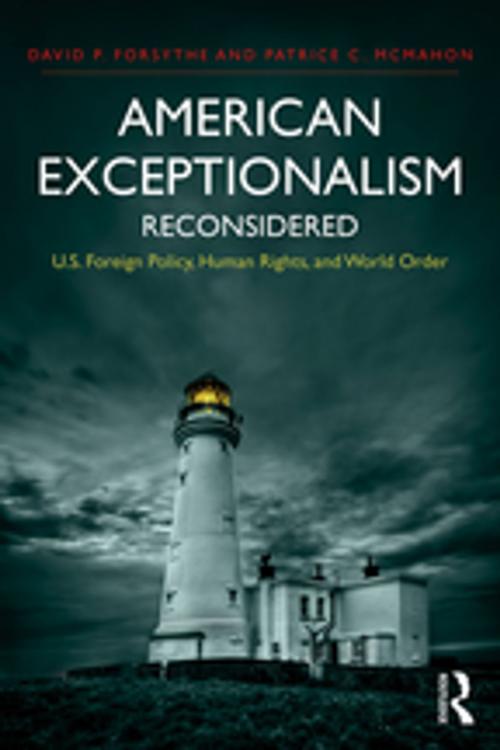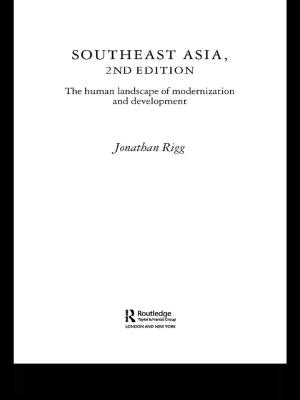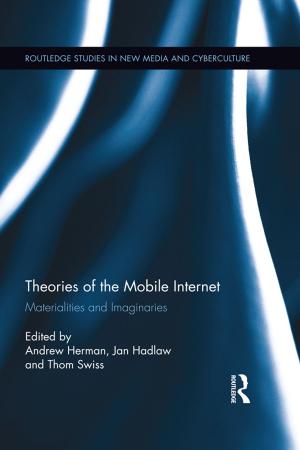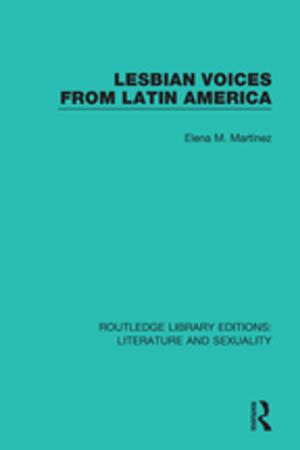American Exceptionalism Reconsidered
U.S. Foreign Policy, Human Rights, and World Order
Nonfiction, Social & Cultural Studies, Political Science, Government, Civics, International, International Relations| Author: | David P. Forsythe, Patrice C. McMahon | ISBN: | 9781317352365 |
| Publisher: | Taylor and Francis | Publication: | November 25, 2016 |
| Imprint: | Routledge | Language: | English |
| Author: | David P. Forsythe, Patrice C. McMahon |
| ISBN: | 9781317352365 |
| Publisher: | Taylor and Francis |
| Publication: | November 25, 2016 |
| Imprint: | Routledge |
| Language: | English |
Is the US really exceptional in terms of its willingness to take universal human rights seriously? According to the rhetoric of American political leaders, the United States has a unique and lasting commitment to human rights principles and to a liberal world order centered on rule of law and human dignity. But when push comes to shove—most recently in Libya and Syria--the United States failed to stop atrocities and dithered as disorder spread in both places. This book takes on the myths surrounding US foreign policy and the future of world order. Weighing impulses toward parochial nationalism against the ideal of cosmopolitan internationalism, the authors posit that what may be emerging is a new brand of American globalism, or a foreign policy that gives primacy to national self-interest but does so with considerable interest in and genuine attention to universal human rights and a willingness to suffer and pay for those outside its borders—at least on occasion. The occasions of exception—such as Libya and Syria—provide case studies for critical analysis and allow the authors to look to emerging dominant powers, especially China, for indicators of new challenges to the commitment to universal human rights and humanitarian affairs in the context of the ongoing clash between liberalism and realism.
The book is guided by four central questions: 1) What is the relationship between cosmopolitan international standards and narrow national self-interest in US policy on human rights and humanitarian affairs? 2) What is the role of American public opinion and does it play any significant role in shaping US policy in this dialectical clash? 3) Beyond public opinion, what other factors account for the shifting interplay of liberal and realist inclinations in Washington policy making? 4) In the 21st century and as global power shifts, what are the current views and policies of other countries when it comes to the application of human rights and humanitarian affairs?
Is the US really exceptional in terms of its willingness to take universal human rights seriously? According to the rhetoric of American political leaders, the United States has a unique and lasting commitment to human rights principles and to a liberal world order centered on rule of law and human dignity. But when push comes to shove—most recently in Libya and Syria--the United States failed to stop atrocities and dithered as disorder spread in both places. This book takes on the myths surrounding US foreign policy and the future of world order. Weighing impulses toward parochial nationalism against the ideal of cosmopolitan internationalism, the authors posit that what may be emerging is a new brand of American globalism, or a foreign policy that gives primacy to national self-interest but does so with considerable interest in and genuine attention to universal human rights and a willingness to suffer and pay for those outside its borders—at least on occasion. The occasions of exception—such as Libya and Syria—provide case studies for critical analysis and allow the authors to look to emerging dominant powers, especially China, for indicators of new challenges to the commitment to universal human rights and humanitarian affairs in the context of the ongoing clash between liberalism and realism.
The book is guided by four central questions: 1) What is the relationship between cosmopolitan international standards and narrow national self-interest in US policy on human rights and humanitarian affairs? 2) What is the role of American public opinion and does it play any significant role in shaping US policy in this dialectical clash? 3) Beyond public opinion, what other factors account for the shifting interplay of liberal and realist inclinations in Washington policy making? 4) In the 21st century and as global power shifts, what are the current views and policies of other countries when it comes to the application of human rights and humanitarian affairs?















